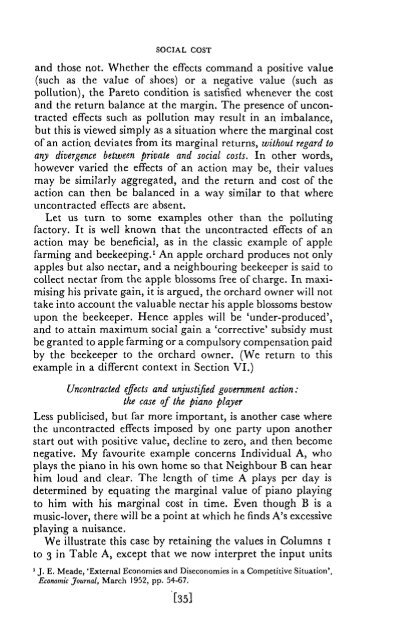THE MYTH OF SOCIAL COST.pdf - Institute of Economic Affairs
THE MYTH OF SOCIAL COST.pdf - Institute of Economic Affairs
THE MYTH OF SOCIAL COST.pdf - Institute of Economic Affairs
Create successful ePaper yourself
Turn your PDF publications into a flip-book with our unique Google optimized e-Paper software.
<strong>SOCIAL</strong> <strong>COST</strong><br />
and those not. Whether the effects command a positive value<br />
(such as the value <strong>of</strong> shoes) or a negative value (such as<br />
pollution), the Pareto condition is satisfied whenever the cost<br />
and the return balance at the margin. The presence <strong>of</strong> uncontracted<br />
effects such as pollution may result in an imbalance,<br />
but this is viewed simply as a situation where the marginal cost<br />
<strong>of</strong> an action deviates from its marginal returns, without regard to<br />
any divergence between private and social costs. In other words,<br />
however varied the effects <strong>of</strong> an action may be, their values<br />
may be similarly aggregated, and the return and cost <strong>of</strong> the<br />
action can then be balanced in a way similar to that where<br />
uncontracted effects are absent.<br />
Let us turn to some examples other than the polluting<br />
factory. It is well known that the uncontracted effects <strong>of</strong> an<br />
action may be beneficial, as in the classic example <strong>of</strong> apple<br />
farming and beekeeping. 1 An apple orchard produces not only<br />
apples but also nectar, and a neighbouring beekeeper is said to<br />
collect nectar from the apple blossoms free <strong>of</strong> charge. In maximising<br />
his private gain, it is argued, the orchard owner will not<br />
take into account the valuable nectar his apple blossoms bestow<br />
upon the beekeeper. Hence apples will be 'under-produced',<br />
and to attain maximum social gain a 'corrective' subsidy must<br />
be granted to apple farming or a compulsory compensation paid<br />
by the beekeeper to the orchard owner. (We return to this<br />
example in a different context in Section VI.)<br />
Uncontracted effects and unjustified government action:<br />
the case <strong>of</strong> the piano player<br />
Less publicised, but far more important, is another case where<br />
the uncontracted effects imposed by one party upon another<br />
start out with positive value, decline to zero, and then become<br />
negative. My favourite example concerns Individual A, who<br />
plays the piano in his own home so that Neighbour B can hear<br />
him loud and clear. The length <strong>of</strong> time A plays per day is<br />
determined by equating the marginal value <strong>of</strong> piano playing<br />
to him with his marginal cost in time. Even though B is a<br />
music-lover, there will be a point at which he finds A's excessive<br />
playing a nuisance.<br />
We illustrate this case by retaining the values in Columns i<br />
to 3 in Table A, except that we now interpret the input units<br />
1 J. E. Meade, 'External Economies and Diseconomies in a Competitive Situation',<br />
<strong>Economic</strong> Journal, March 1952, pp. 54-67.<br />
[35]












